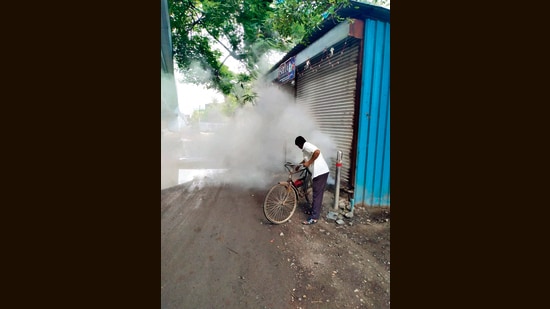
ZIKA CASES IN PUNE: EXPERTS ADVISE TO SCALE UP SURVEILLANCE, PREVENTIVE MEASURES
The scientist from the Indian Council of Medical Research’s (ICMR)—National Institute of Virology (NIV) Pune and experts from National Vector Borne Disease Control Programme (NVBDCP), public health department and BJ Medical College (BJMC) held a statewide meeting on Monday to counter the Zika virus threat.
Maharashtra has reported eight cases of Zika virus in the state. Out of them, six cases have been reported in Pune city and one each in Kolhapur and Sangamner.
Over 30 doctors from Pune Municipal Corporation (PMC) attended the meeting, said officials.
The online meeting was attended by NIV scientists and health experts, which included Dr Radhakishan Pawar, joint director of health services and state head of NCVBDCP; Dr Rinku Sharma, joint director of NCVBDCP; Dr Kalpana Barua, consultant and former additional director, NCVBDCP; Dr Premchand Kamble, additional director of health services, NCVBDCP; and health experts Dr Savita Kamble.
Scientists from NIV, Pune included Dr Gajanan Sapkal, Dr Yogesh Gurav, and Dr Kavita Lole andDr. Rajesh Karykarte, head of the microbiology department at BJ Medical College and Sassoon General Hospital.
Dr Radhakishan Pawar, joint director of health services, said, all local bodies, especially PMC have been asked to scale up the entomological surveillance for Aedes and enhance surveillance.
“The larval survey will be done to determine the major breeding places in domestic areas to initiate the source reduction measures. PMC is asked to enhance fever surveillance within a perimeter of a five-kilometre radius. All pregnant women should be tested, and the growth of the foetus should be monitored,” he said.
As per officials, Zika virus can be transmitted by mosquito bites, sexual contact, mother-to-fetus during pregnancy, blood transfusion and organ donation. Zika virus infection during pregnancy can cause microcephaly and other congenital malformations in the infant, including limb contractures, high muscle tone, eye abnormalities and hearing loss. These clinical features are collectively called congenital Zika syndrome. It can also cause Guillain-Barre Syndrome in the fetus, they said.
Dr Rajesh Dighe, assistant health officer of PMC, said, the NIV experts have asked us to take samples of expecting mothers not just from the affected areas but also outside the affected areas.
“We have been asked to monitor the growth of the fetus of expecting mothers who have tested positive for Zika and ultrasound tests and anomaly scan should be done. In case of any abnormality is found in the child the norms regarding the termination of pregnancy were discussed,” he said,
Dr Dighe said that following the two index cases of Zika virus from the Erandwane area there are speculations that the source of infection should be the hospital in which the 46-year-old doctor is associated.
“The team will conduct a visit to the hospital tomorrow to check mosquito breeding in the hospital. There is a possibility that the infection could be hospital-acquired,” he said.
Dr Karyakarte, said, it is of significance that we identify which Zika virus strain is in circulation in Pune and other parts of the state.
“We have the experts and facilities to conduct whole genomic sequencing of Zika virus to identify the virus strain or if there is any new mutation in the virus. If the state government gives us directions, we can start the genomic sequencing for Zika virus. There are two strains of the Zika virus—the Asian-lineage strain and the African strain. The Asian strain has further mutated into the Brazilian strain. The Brazilian strain is more virulent as it is known to cause microcephaly in the foetus. It is important to identify which strain is prevalent so that appropriate epidemiological measures can be implemented,” he said.
Read more news like this on HindustanTimes.com
2024-07-02T01:54:40Z dg43tfdfdgfd